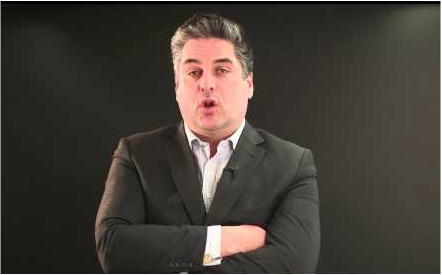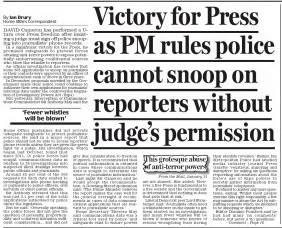
They now have the Prime Minister, Deputy Prime Minister, Home Secretary and Culture Secretary on side and the promise of action in response to the Interception of Communications Commissioner's report yesterday.
That report found that police chiefs signing off applications to look at journalists' data had not paid sufficient attention to Article 10 of the European Convention on Human Rights, which enshrines the right to freedom of expression and sets out the special circumstances in which that right might be curbed.
The Regulation of Investigatory Powers Act - the only law under which police may look at these sorts of records - stipulates that for an application to be granted, it needs to show that access to the data is necessary and proportional. That means the prospective public benefit needs to be greater than the potential damage caused by the intrusion.
The commissioner's report states that in most of the cases involving journalists' records over the past three years, those criteria were not met. The report suggests that that may have been because neither Home Office nor ACPO guidance on the subject addressed the question of Article 10. In other words, nobody thought about it properly.
That is unsatisfactory, troubling even, but there is no suggestion in the report that the police were abusing their powers under the Act. On the contrary, the report says:
Police forces are not randomly trawling communications data relating to journalists in order to identify their sources. The applications examined in the main related to investigations where public officials were suspected of criminal conduct or where a media organisation had voluntarily disclosed information to the police relating to what they believed to be criminal conduct for investigation.
But this is no love letter to the Press. One of the grounds for seeking access to data is for the "prevention or detection of crime", and the report underscores the point: "The Act does not restrict the acquisition of communications data to serious crime which is defined at section 81(2) and (3) of the Act."
It continues:
It is therefore unhelpful when the reports in the media misinform the public by stating the use of powers to acquire communications data for crimes, not deemed to be of a serious nature under the Act, are inappropriate. It is also wrong for the reports in the media to cite the Act as a terrorist law and infer that its use for non-terrorist related matters is inappropriate.
According to the CPS...in cases which rely on the disclosure of journalistic sources or on covert techniques which involve or amount to the revealing of a source's identity, the prosecution will have to satisfy the court that the admission of evidence that reveals the identity of a journalistic source is exceptionally required by a pressing social need and that it is proportionate in the circumstances of the case. This can be done... but the prosecution will have to rebut the presumption that it is always prima facie contrary to the public interest that press sources should be disclosed. Expressed another way, there is an underlying assumption that it is not in the public interest to identify a journalist’s source.
Very important factors will be required to outweigh the general right of a journalist to keep sources confidential. It is therefore important that offences are not investigated in ways which are contrary to Principle 6 [of Article 10], unless the circumstances are sufficiently serious and vital to warrant this.
So how wrong it it of the media to talk about serious crime?
The key concern for the commissioner was clearly the protection of sources, not of journalists. It was also, presumably, the key issue for Press Gazette, since it labelled its campaign Save Our Sources.
There has been celebration today of the recommendation that a judge should approve applications relating to journalists - but most reports have omitted the caveat in the second half of the sentence from their intros. Here it is in full (my underscore):
Judicial authorisation must be obtained in cases where communications data is sought to determine the source of journalistic information.
Why shouldn't they? some might ask. No similar protection is proposed for lawyers, doctors, priests and their confidential dealings with clients, patients or parishioners. Perhaps their respective trade journals should kick up a fuss as Press Gazette did.
And how about all the other people whose personal data are scrutinised? About half a million applications are made by public authoirities every year for the right to access phone and email records. The commissioner learnt that 608 applications over the past three years (0.1% of the total authorised by the police) related to journalists' links with public officials - and not all of those involved looking at the journalists' data. In 24 of the 34 investigations, journalists' records were not examined.
There is also the Wapping effect. Eighty per cent of the applications came from officers working on Operation Elveden, which looked into alleged illegal payment of public officials by journalists. And remember News International's Management and Standards Committee voluntarily handed over masses of material, so the cops would presumably in many cases have been asking permission to look at what they had in their hands.
Exclude Elveden and the total number of applications relating to journalists' data was equivalent to less than one per force per year. Put that way, as it is by the commissioner, it seems modest. Put another way, as it is by Ponsford in his Press Gazette blog, there were still 124 RIPA applications for telecoms records of journalists who were not suspected of any crime.
That isn't right. And it is right for the trade magazine to highlight this. It is also right to ask the circumstances of these applications and, at the very least, for the targeted journalists to be informed.
Legitimate concerns have been raised about the use of RIPA to uncover the sources of the Plebgate and Chris Huhne stories. The CPS declined to prosecute the Plebgate whistleblowers, saying: "We have concluded that a jury is likely to decide that it was in the public interest for the events at the gate to be made public." In the Huhne case, a judge specifically ruled that the source should not be identified, yet the police continued their pursuit.
It is therefore in the public interest for the police to have to explain their actions in other non-Elveden cases.
But this business of police looking at people's metadata without having to consult an outside authority is not a worry exclusive to journalists. We are a speck on this landscape.
This morning's papers reported the proposed change in the law as a triumph for the freedom of the Press, proof that vindictive police had been abusing their powers:

It is an important moment for our industry. But at a time when journalists are too often seen as self-serving and self-important, would it not have been good at least to avoid the very language criticised in the commission's report?
And even better to have paid some attention to the other one and a half million people whose privacy was invaded under this act over those three years?











 RSS Feed
RSS Feed


